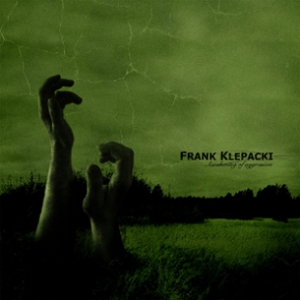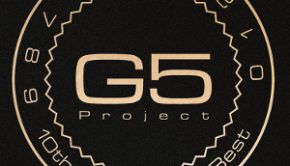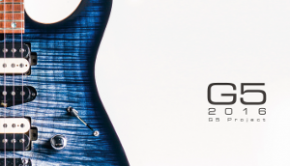Awakening of Aggression
 |
Album Title: Awakening of Aggression |
| Record Label: Klepacki Productions |
|
| Catalog No.: N/A |
|
| Release Date: January 1, 2006 |
|
| Purchase: Buy at Official Site |
Overview
After experimenting with dance sounds on 2005’s strong, but slightly uneven Virtual Control, Frank Klepacki shifted his musical focus once more the following year on his new solo albumAwakening of Aggression. In tune with its belligerent title, the album marked a return to the guitar-heavy stylings of Rocktronic. According to his notes on Awakening of Aggression that Klepacki published in 2013 on his Facebook page, the album was an intensely personal affair, in the sense that it was a constructive outlet for the frustrations and disappointments that Klepacki had experienced in the year before working on Awakening of Aggression.
Body
Awakening of Aggression‘s title tells no lies – while Klepacki’s previous solo albums had always contained hard rocking tracks and a generally heavy sound, Awakening of Aggression takes these tendencies to a new level, creating another album that manages to find its individual place within Klepacki’s body of work. More often than not, Klepacki’s earlier hard rock tracks – both on his solo and his game albums – included elements of other genres, particularly funk/hip hop and industrial music. On Awakening of Aggression, Klepacki still crossbreeds different genres, but more squarely than ever before, his focus his on letting distorted guitar riffs and plodding drum rhythms do the job of pummelling the listener into submission. What’s remarkable about Awakening of Aggression‘s harshest tracks is not just how powerful they are, but how claustrophobic and suffocating they sound, only increasing the music’s atmospheric pull. Klepacki purposefully distorts guitar riffs and other instruments close to breaking point, giving Awakening of Aggression a rough, dirty sound that suits the album’s purpose as a valve for anger and frustration perfectly.
“Kill” is the first track on Awakening of Aggression to present the album’s crunchy, mid-tempo guitar riffage and pounding drum rhythms that can explode into uninhibited double bass rage when called upon. Due to Klepacki’s consistently strong songwriting, it’s a formula that results in some of his most intense and tight music to date. Klepacki quotes Pantera’s Far Beyond Driven as one of his sources of inspiration for Awakening of Aggression, and “Kill” is one of the album’s clearest manifestations of this inspiration. The cue also stands out from similar tracks on Awakening of Aggression through its closing, blistering high-speed guitar solo, which can’t help but feel a bit at odds with the grungy energy and tempo of the song as a whole – although there’s no denying it’s an impressively frenzy solo. “Brain Dead” continues in a similar vein to equally punishing results, with the double bass drumming on the track’s finale sounding almost subterranean in the track’s purposefully sludgy mix. Some brief, forsaken guitar leads among the almost non-stop barrage of riffs are a nice addition and it would have been great to see their potential explored in more depth than here. Finally, album closer “Rage and Fury” takes the album’s bitterness to an extreme, with every single instrument distorted and some odd time signatures thrown into the mix for good measure, creating a listening experience that’s even more smothering and uneasy than “Kill” and “Brain Dead”. Klepacki’s aim for the song was for it “to sound as uncomfortable and over the top as possible”, and he certainly hits the spot when “Rage and Fury” culminates in a manically hammering finale, only to then fade out exhaustedly over static noise after the music has finally attained its grim catharsis. Like Virtual Control‘s “Vengeance Beast”, “Rage and Fury” ends the album with a bang, but it’s a much grimier, hard-won finale.
This being a Frank Klepacki album, there’s of course more than music genre involved, even thoughAwakening of Aggression channels one specific mood more exclusively than his previous albums. Sequenced together with “Brain Dead” and “Rage and Fury” in the album’s second, roaring half, “Magnafried” and “Vigilante” are no less impacting than their fellow album tracks, but add some variety by introducing new colours. “Magnafried” gains its level of aggression through distorted synths that give the track a more uptempo and futuristic feel than most other cues on Awakening of Aggression. At the halfway point, “Magnafried” brings back ringing, biting metal guitars with a vengeance and manages to combine energising, driving synth beats with crunching guitar riffs in one angry coupling. “Vigilante”, one of the album’s longer tracks, opens up its scope with a surprising classical piano intro that introduces the track’s Gothic horror tendencies. These also manifest themselves in the hard rocking songs’s piano-led breakdowns and choir samples, adding eeriness while the track’s punchy hip-hop rhythms give the music vibrancy and differentiate it from the trudging tempo of Awakening of Aggression‘s other hard rock tracks. Hip hop elements play a bigger role still on “Rox”, a darker sibling of Klepacki’s previous heavy funk/hip hop and hard rock blends. One of the best tracks of its ilk that Klepacki has produced, “Rox” is the most colourful song on the album, with powerful grooves, numerous swift changes and breakdowns that still feel organic, and an undercurrent of aggression that ties it in with the other cues. “Krung Kick” isn’t quite as successful as “Rox” – its first half, pitting distorted guitars against heavy hip hop beats and the occasional funky brass insert for some retro appeal, is more entertaining than the track’s more contemporary, grittier second half. Still, “Krung Kick” remains a solid addition to the album.
In another demonstration of clever album programming, “Fantasy”, Awakening of Aggression‘s longest and most languid track, appears around the album’s halfway-mark, slowing things down before later cues ramp up the music’s intensity again in preparation for Awakening of Aggression‘s raging finale. The track is the album’s most experimental cue, running at close to seven minutes and presenting the synth sets Klepacki often used on his Command & Conquer stealth tracks, but now in more low-key, gloomy fashion. Beginning on a subdued, atmospheric rather than energetic note, “Fantasy” retains a slow boiling tension that finds its outlet when the track segues into sections with an industrial, menacing flavour. Slowly sucking in listeners rather than steamrolling over them, “Fantasy”’s slowly enveloping atmosphere doesn’t turn monotonous despite its minimalist nature, as Klepacki introduces just enough well-timed changes to the track’s textures. While “Fantasy” might defy expectations, but still delivers the goods, “Strange” has a harder time to convince with its odd mix of synthetic and live instruments. The cue hops through a number of abrupt changes that don’t fracture “Strange” as much as one would expect at first, but a track like “Rox” still does a better job at bringing together a multitude of different ideas in one coherent song, and at keeping the album’s energy level consistently high.
Summary
Living up to its name, Awakening of Aggression is Klepacki’s rawest, most hard-hitting album to date. Eschewing the militaristic undertones of Klepacki’s previous solo albums and Command & Conquer scores which gave his hard rock/metal-influenced tracks a certain catchiness, Awakening of Aggression most intense tracks are asphyxiating riff-monsters that go for the jugular. A purposefully murky album mix and distorted instruments create a stifling atmosphere that is as important to the album’s success as the bone-crunching energy of Klepacki’s riffage and drumming.Awakening of Aggression is far from one-note though, as Klepacki finds other ways than just fearsome hard rock to vent his frustrations, incorporating funk, hip hop and synth sounds as on previous albums – only in a heavier brew than usually. Even a languorous synth mood setter like “Fantasy” finds its natural place on Awakening of Aggression, once more showcasing Klepacki’s versatility. Awakening of Aggression isn’t Klepacki’s most accessible solo album, but it might just be his most relentless and fierce work.+
Do you agree with the review and score? Let us know in the comments below!
4
Posted on April 20, 2014 by Simon Elchlepp. Last modified on April 16, 2014.














